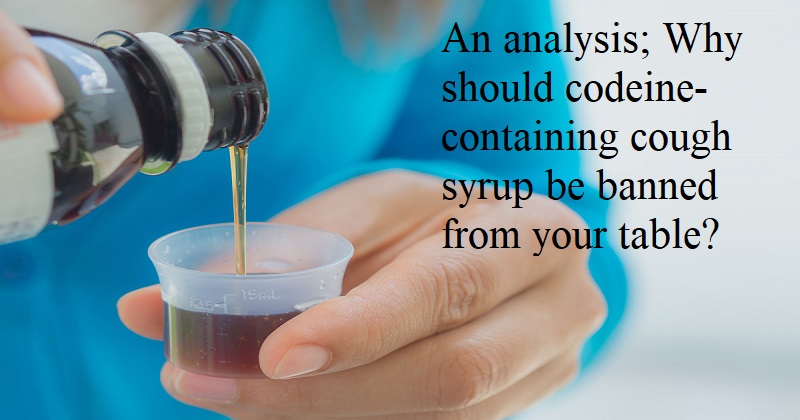
Winters, when practically everyone experiences dry cough episodes, are upon us, along with the irrational rush to buy over-the-counter (OTC) cough syrups at chemist stores. These OTC cough syrups frequently include codeine, an opiate that can lead to addiction. A 30 mg morphine tablet and a 100ml bottle of codeine-containing cough syrup have the same effect. Codeine is technically a pro-drug made from opium that the liver transforms into morphine.
Although there are more than 100 CCSs on the market, Phensedyl or Corex brands dominate. Some people have too much anxiety and restlessness without it. One’s metabolism also has a significant impact on how vulnerable they are. In North Africa, the gene variation linked to ‘ultra-fast metabolizers’ is present in about 40% of the population. Dizziness, slurred speech, auditory hallucinations, hot or cold flashes, an elevated heart rate, impaired vision, hyperexcitability, and high blood pressure are side effects of codeine-containing cough syrup (CCS). That’s only the very tip of the iceberg.
Increasing ban calls
In August of this year, lawmakers once again expressed their concern about CCSs and their use as drugs and intoxicants. After ingesting cough syrups tainted with diethylene glycol but devoid of codeine, 66 children in the Gambia perished. Although the government wants to impose a ban, the drug companies are fighting it tooth and claw. To stop the clamour for a ban, the Indian Drug Manufacturer Association (IDMA) is making every effort. The government exchequer could lose 300 crore rupees as a result of the prohibition, according to IDMA. CCSs were one of the 350 or so fixed dose combination medications that the government had outlawed as of March 2016.
Cross-border smuggling & crackdowns
In India, around 83,000 bottles of CCS were seized in the six months leading up to March 2015. In all, 2,635,848 litres of codeine-containing cough syrup were seized during the years 2014 and 2015. Despite occasional crackdowns, CCS misuse has been on the rise.
More than 1,13,000 bottles of Phensedyl heading for Bangladesh were destroyed by customs officials in Tripura’s Agartala in August 2015. The very next month, four trucks containing 21,400 Phensedyl bottles were impounded by the Border Security Force (BSF) and customs officers. State-run laboratories in West Bengal discovered twice as much codeine (21.37 mg/5ml dose as opposed to 10 mg/5ml) in a batch of Phensedyl bottles in July 2015.
For smuggling two lakh bottles of a well-known cough syrup sold by a large international pharmaceutical company, Haryana’s food and pharmaceuticals administration department arrested two medication merchants in March 2016. In April 2017, the State Narcotic Crime Control Cell (SNCCC) and the Drug Control Administration (DCA) raided Sirmaur area in Himachal Pradesh and recovered at least 10,000 CCS bottles.
More than 42,000 bottles of safe codeine phosphate cough syrup worth Rs 47 lakh were seized in July by the NCB Ahmedabad and FDCA Gujarat. Near Guwahati, the CID conducted raids in May and found over 9,500 bottles of cough syrups containing codeine. During the lockdown, the BSF confiscated approximately 33,536 bottles of Phensedyl from traffickers along the south Bengal front (March 25 to May 24, 2020).
An important member of the home ministry has stated that the smuggling of cough syrups is a key source of friction between India and Bangladesh. In September of this year, employees of the Directorate of Revenue Intelligence confiscated over a lakh CCS bottles valued Rs. 1.76 crore. According to a report produced by the BSF’s south Bengal frontier in 2020, a well-oiled network of individuals, including top executives from pharmaceutical companies, are involved in this criminal activity.
Insufficient and tardy
A ban on CCSs was announced by the government in 2016. In order to combat drug addiction and smuggling, pressure was put on businesses to regulate how they sold their products. But other from lip service, US-based Pfizer and Abbott Laboratories haven’t done much to stop the abuse. The corporations have been under pressure from the ministry of finance to permit tracking of each batch produced.
Corrective actions
India should not allow the sale of cough medications containing codeine phosphate without a prescription. Requesting that pharmacists keep their sales receipts could be a wise move. The strength of the regulatory bodies must be increased while giving them more teeth. Why can’t India do it if Sweden, Latvia, Sri Lanka, and the Maldives can?

Post Your Comments